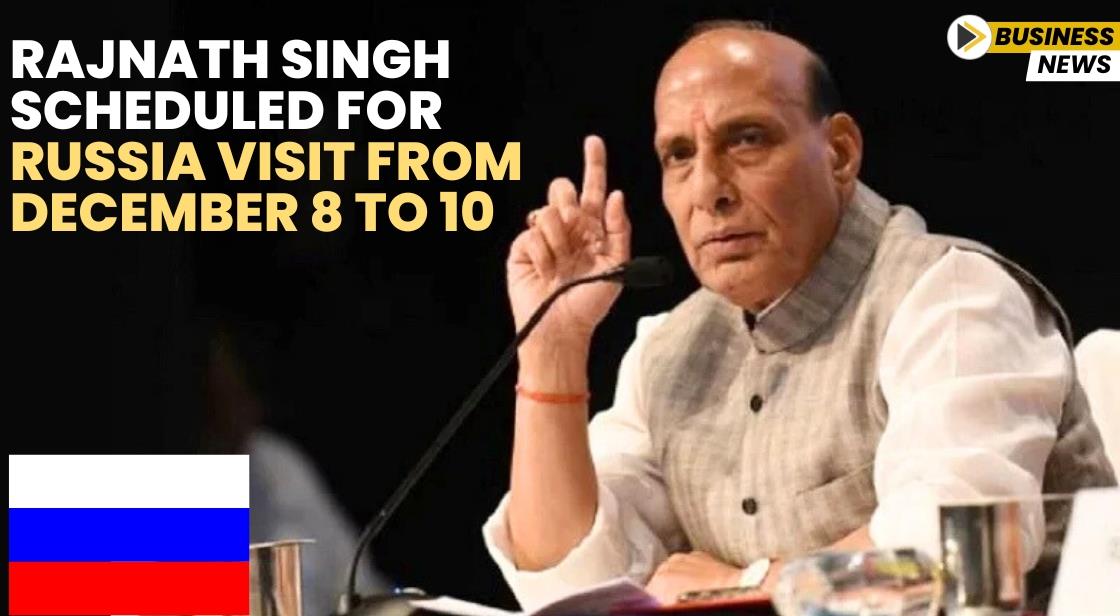Rajnath Singh Scheduled for Russia Visit from December 8 to 10

News Synopsis
Defence Minister Rajnath Singh is set to visit Russia from December 8 to 10, according to a report by Russia's TASS state news agency, citing a source in New Delhi. This visit marks an important diplomatic engagement between India and Russia. Singh’s visit will include stops in Moscow, the Russian capital, as well as Kaliningrad, a Russian exclave located in Europe. The strategic purpose of this visit remains significant, as it is aimed at bolstering bilateral relations between the two nations, particularly in the defence and strategic sectors.
Details of the Visit: Moscow and Kaliningrad
During his visit, Rajnath Singh will meet with Russian officials to discuss various matters concerning India-Russia relations. The inclusion of Kaliningrad in Singh's itinerary is noteworthy, as it highlights India's interest in strengthening ties across all regions of Russia. Kaliningrad, while geographically separated from the rest of Russia, plays a key role in the country’s security and foreign policy and has implications for broader geopolitical dynamics. The meetings are expected to focus on defence cooperation, strategic partnerships, and other areas of mutual interest, continuing the long-standing relationship between the two countries.
Russian President Putin’s Likely Visit to India
In the same context, media reports earlier this month suggested that Russian President Vladimir Putin might visit India in the coming months. While the exact dates of the visit remain unconfirmed, the visit is expected to further solidify the diplomatic and strategic ties between India and Russia. The prospect of President Putin's visit follows Prime Minister Narendra Modi's invitation extended to him during their talks in Moscow earlier this year.
Prime Minister Modi’s July Visit to Moscow
Prime Minister Narendra Modi’s diplomatic trip to Moscow in July this year served as an important milestone in strengthening the bilateral relationship between India and Russia. Modi emphasized the need for continued dialogue between the two countries, particularly in the context of global peace and security, during his discussions with President Putin. The visit underscored the ongoing collaboration in various sectors, including defence, energy, and trade, between the two nations.
During the visit, Prime Minister Modi was also hosted by President Putin at his official residence, Novo-Ogaryovo, for a private engagement. The two leaders shared a meaningful interaction, with President Putin praising PM Modi for the progress India has made under his leadership. The visit to Moscow was pivotal in reaffirming the long-standing strategic partnership between India and Russia.
PM Modi’s Attendance at the BRICS Summit in Kazan
Later in October, Prime Minister Modi visited Russia once again, this time to attend the 16th BRICS Summit held in Kazan. This visit was part of his broader efforts to deepen India’s engagement with the BRICS countries. Modi’s participation at the summit was significant as it reaffirmed India’s commitment to the BRICS agenda and its role in global multilateral forums.
The BRICS Summit in Kazan also provided an opportunity for further collaboration on various issues, including economic development, global governance, and sustainable growth. Modi’s visit underscored India’s continued role in global diplomacy and multilateral cooperation.
Conclusion: Strengthening India-Russia Relations
Rajnath Singh’s upcoming visit to Russia is an important step in the ongoing process of strengthening bilateral relations between India and Russia. With Prime Minister Modi’s earlier visits and the anticipation of President Putin’s visit to India, the two countries are reinforcing their strategic partnership, particularly in defence, energy, and multilateral cooperation. As both nations continue to face evolving global challenges, these high-level exchanges remain crucial for shaping their future collaboration on the world stage.
You May Like









